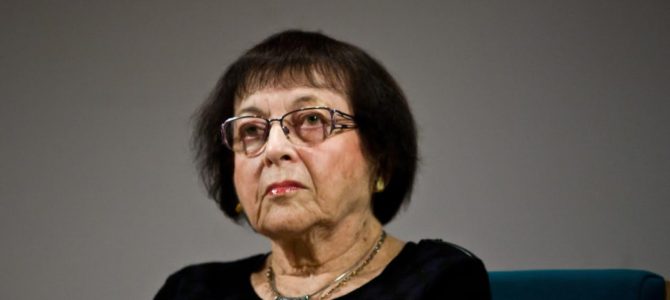
bernardinai.lt
We offer an excerpt from the newly-published book of conversations by historian Aurimas Švedas called “Irena Veisaitė. Gyvenimas turėtų būti skaidrus“ [rena Veisaitė: Life Should Be Transparent] (lAukso žuvys publishing house) with German literature scholar, theater specialist and long-time director of the Open Society Fund of Lithuania Irena Veisaitė about her life story and thoughts about history. The book was launched at the Vilnius Picture Gallery December 15. The author and Veisaitė herself attended the book launch along with other people who know of her achievements in life and her influence on Lithuanian culture.
Švedas in his introduction to his book said: “Irena Veisaitė’s personal history allows us a glimpse of four 20th-century epochs: the interwar period, the time of the first Soviet and the Nazi occupation, the Soviet period and the years of restoration and consolidation of Lithuanian independence. The book’s heroine’s retelling of her life helps interpret the aforementioned epochs and build bridges over the gaps of miscommunication and misunderstanding which separate them. So as we spoke, I didn’t just pose the question of what really happened, I also constantly looked for opportunities to think about what, how and why we remember,”
Your life is simply suffused with the most varied events and extreme experiences. Did you ever think about sitting down and recording some of it on paper?
Of course I did. Further, others called on me to do so, but I simply couldn’t and didn’t want to go into my memories for very different reasons. Returning to the past you have to experience it emotionally, and that’s intolerable. I live with my armor. For you to understand what that metaphor means, I’ll tell you about one thing that happened. When two of my students and I, Audra Žukaitytė ir Reda Pabarčienė, went to see Andrzej Wajda’s film Holy Week [1995], they left the theater crying, while I accepted totally calmly the moving story on the screen about the fate of a Jewish woman in Warsaw during World War II. Of course I wondered at my own reaction: what’s going on here? Then I realized very clearly that I live in armor.
Another reason why I never wrote my memoirs and never wanted to is connected with my lifestyle, or perhaps my personality. I have always lived actively and spiritually in the present and for that reason have never had time for the past. I’ve always had to think about something, write, work, participate. Teaching, which I saw as my individual mission, demanded a lot of my heart and time…
Full interview in Lithuanian here.

